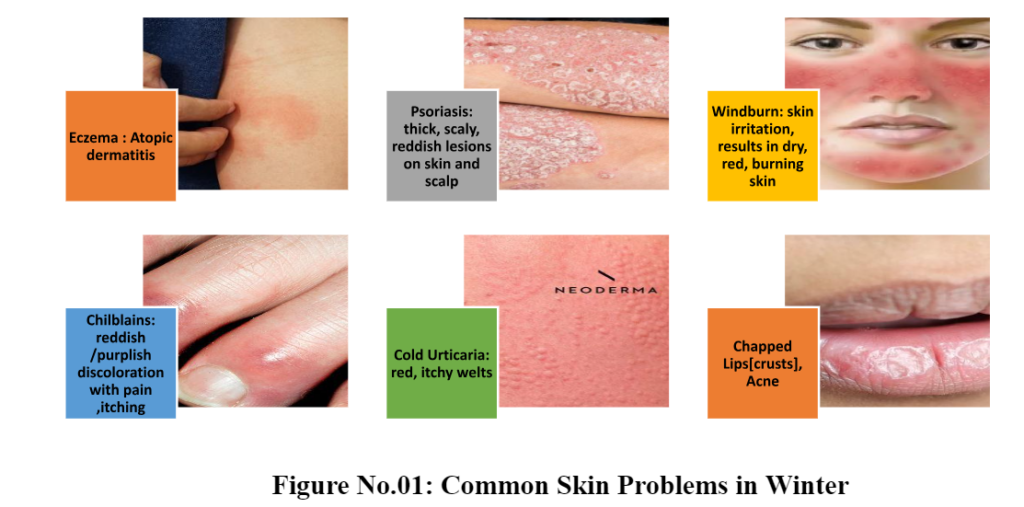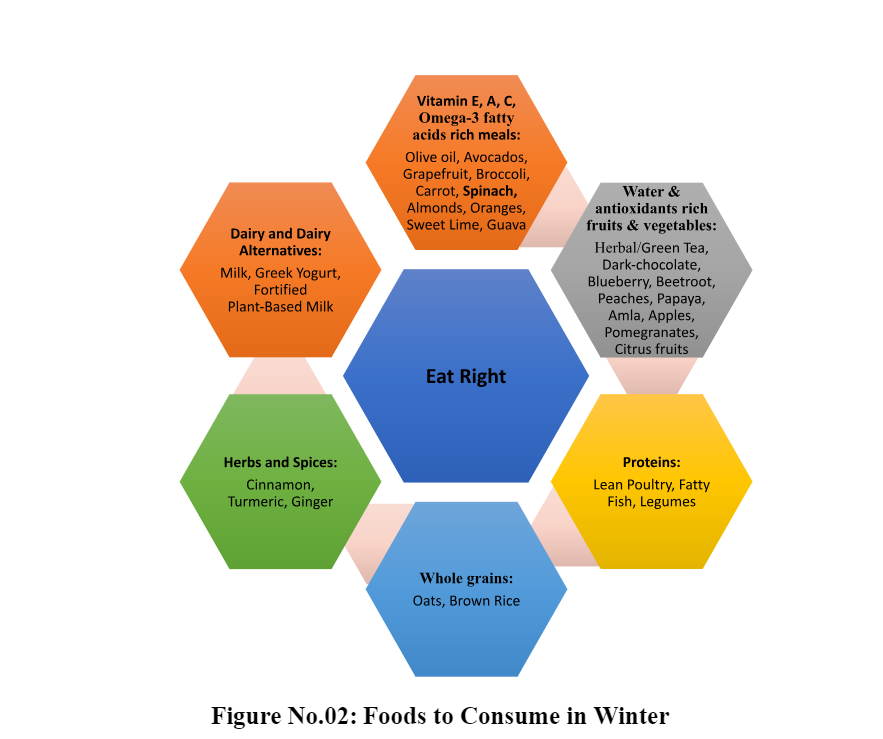Hydrating from within by drinking an adequate amount of water also plays a significant role in maintaining skin suppleness and combating the dehydrating effects of winter.
Maintaining nourished and healthy skin during winter is paramount due to the season’s inherent challenges, including dry air, cold temperatures, harsh weather conditions and winter rashes. The combination of these factors can strip the skin of its natural moisture, leading to dryness, flakiness, irritation and Cold Urticaria in some cases.

Proper skincare practices, such as regular moisturizing, using gentle cleansers, and protecting the skin from the environmental factors are crucial. Moreover, it’s essential to recognize the role of nutrition in supporting skin health during wnter season. Consuming foods rich in essential fatty acids, antioxidants, and vitamins, such as omega-3 fatty acids, vitamin E, and vitamin C in fruits and vegetables, can contribute to skin nourishment from the inside out. Hydrating from within by drinking an adequate amount of water also plays a significant role in maintaining skin suppleness and combating the dehydrating effects of winter. Integrating these practices into a holistic skincare routine helps fortify the skin barrier and promotes a radiant complexion even in the harshest winter conditions.

Water- Rich Fruits And Vegetables:
The cold weather, coupled with low humidity levels, can strip the skin of its natural moisture, leading to dry and flaky skin. Drinking water is foremost important to stay hydrated. Along with this consuming water- rich fruits and vegetables like watermelon, cucumber, zucchini, tomatoes, coconut water etc.
Omega-3- Fatty Acids:
Counteract winter dryness by upping your intake of omega-3 fatty acids. These healthy fats help fortify the skin’s lipid barrier, preventing moisture loss and promoting a supple complexion. Salmon, mackerel and other sources like chia seeds, flaxseeds can also be taken as omega-3- fatty acids supplements.
Antioxidants:
Antioxidants safeguard your skin from environmental stressors. Berries, such as blueberries and raspberries, offer potent antioxidants that combat oxidative stress. Integrate colorful vegetables like spinach and carrots into your meals for a spectrum of skin-supporting vitamins and minerals.
Vitamin- C:
The formation of collagen, a protein that gives the skin structure, depends on vitamin C. It has skin-brightening properties, helping to reduce hyperpigmentation and promote an even skin tone. This can be especially beneficial when the skin might appear dull due to winter conditions. Foods like oranges, strawberries, kiwi, broccoli, bell peppers can be great source of vitamin C.
Herbal Teas:
Many herbal teas are rich in antioxidants, which help combat oxidative stress and protect the skin from environmental damage. Herbal teas, such as chamomile or green tea, hibiscus tea, peppermint tea, rooibos tea contribute to overall hydration and support skin health.
The cold weather, coupled with low humidity levels, can strip the skin of its natural moisture, leading to dry and flaky skin.
Collagen Rich Foods:
Collagen is a structural protein that gives the skin its firmness and elasticity. Consuming collagen-rich foods like bone broth, fish, and lean meats, eggs provides the body with the necessary building blocks to support skin structure. These foods can help combat the signs of aging by promoting skin elasticity and reducing the appearance of fine lines and wrinkles.
Whole Grains:
Whole grains such as oats, quinoa, barley, and brown rice are rich in essential nutrients like vitamins, minerals, and antioxidants. These nutrients contribute to overall skin health and provide the building blocks for a strong, resilient skin barrier.
Vitamin- E:
Vitamin E is an antioxidant that helps protect the skin from damage caused by free radicals, which can be more prevalent due to harsh weather conditions. It also aids in moisturizing and preventing dryness. Vitamin E can be obtained from foods like almonds, sunflower seeds, olive oil, avocado, green leafy vegetables like spinach.
References:
- https://www.artofliving.org/in-en/lifestyle/well-being/winter-foods-glowing-skin
- https://www.ndtv.com/food/skincare-5-winter-foods-to-keep-your-skin-healthy-and-glowing-1952797
- https://helloglow.co/glowing-skin-foods/
- https://www.kaya.in/blog/best-antioxidant-rich-foods-for-glowing-skin-in-winter
- https://www.lifespan.org/lifespan-living/top-winter-foods-your-skin
“Composed by: Priyatama Powar, Associate Professor, Pharmaceutics Department, Dr.D.Y.Patil College of Pharmacy, Akurdi Pune. Published 35 articles in national and international journals. Published 4 books and 5 book chapters. Also active participation as editorial board member in various journals.”

